resettlement
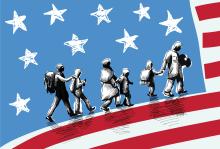
IN 2016, PEOPLE of faith in the city of Billings, Mont., gathered to call for their community to get more involved in resettling refugees. With growing violence, persecution, and strife around the world and a record number of people forced to flee their homes, this community had the heart to help.
But the closest refugee resettlement office in the state was in Missoula, a 345-mile road trip west on I-90. The United States traditionally requires refugees to be resettled with families and relatives or close to these resettlement sites, which help new arrivals land on their feet and access needed services. For Billings — and for many other like-minded communities across the country — it was a logistical challenge to participate in the work of welcome.
Earlier this year, that changed. On Jan. 19, the Biden administration launched Welcome Corps, a new initiative giving everyday Americans the opportunity to sponsor refugees. Groups of at least five can now apply to form “private sponsorship groups,” which are responsible for welcoming refugee newcomers into their communities. These groups agree to assist in providing initial housing; as well as support access to health care, school enrollment, and employment opportunities; and otherwise engage directly in the life-changing work of refugee resettlement.
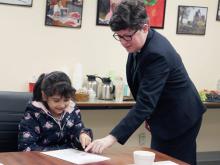
It was her desire to hear the stories of real people — “not just faceless refugees or immigrants” — that brought the Rev. Elizabeth A. Eaton to a refugee resettlement agency that provides a range of services to refugees in the Chicago area.
“Especially now, when there’s this fear that’s been stirred up, and anti-refugee sentiment, it’s really critical to say, ‘No, these people are our grandparents, our aunts and uncles,” said the presiding bishop of the Evangelical Lutheran Church in America, the nation’s largest Lutheran denomination.
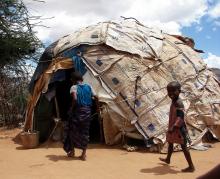
In Dadaab refugee camp, a researcher recorded a Somali term for the particular feeling of longing for resettlement: buufis, “a kind of depression rooted in an inextinguishable hope for a life elsewhere that simultaneously casts the present into shadow.”
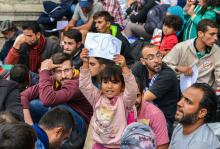
On Sept. 21, Texas Governor Greg Abbott released a statement claiming that refugees “pose grave danger, like the Iraqi refugee with ties to ISIS who was arrested…after he plotted to set off bombs at two malls in Houston.”
This announcement comes months after Texas lost a court battle in June, in which the state attempted to keep Syrian refugees out entirely.
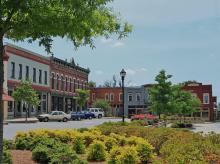
LAST FALL, MAYORS of 18 U.S. cities sent a letter to President Obama, promising to welcome Syrian refugees with open arms. Atop the list was Ed Pawlowski, the mayor of Allentown, Pennsylvania’s third largest city.
Pawlowski said his evangelical Christian faith—and America’s founding ideals—shaped his decision. “We like to say that America was built on Judeo-Christian principles,” he told Sojourners. “Then let’s follow our Judeo-Christian principles, which tell us to welcome the stranger because we were once strangers ourselves.” So far, about 10 Syrian refugee families have come to Allentown in the past year. More are expected.
There’s been some pushback from older Syrian immigrants in the community. Allentown is home to about 5,000 Syrians, many of them Christians who fled persecution in the past. Most of the new arrivals are Muslim.
Aziz Wehbey, head of the local American Amarian Syrian Charity Society, told CBS News he had concerns about the background checks on the new arrivals. “We need to know who we are welcoming in our society,” said Wehbey.
Another local Syrian charity, the Syrian Arab American Charity Association, has collected donations of food, furniture, and clothing for the refugees. So has St. George Antiochian Orthodox Church, where many Syrian immigrants worship.
Pawlowksi has spent a great deal of time talking to residents about their fears, such as concerns that the area will become “overrun” with refugees. He stressed that only a few families are coming to Allentown. They’ve lost everything, the mayor said, and need help: “We can handle this.”
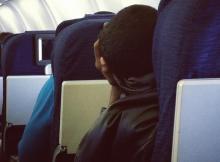
OUR PLANE SITS at the gate in Brussels well past our departure time. Slowly, the empty seats fill with Somali refugees whose flight a day earlier had been cancelled. After a night in the airport, they slide wearily into scattered seats.
Ten years together in a refugee camp in Uganda has melded the group into a close-knit family. What do they feel now, I wonder, knowing that on the other end of this flight they will scatter, not to empty seats but to unknown cities throughout the U.S.? From Syracuse to San Francisco, they will look upon a world they have never imagined. “When will I see my friend?” one little girl asks, not realizing she and her friend will live half a continent apart.
I watch a man a few rows ahead of me. I learn from his friend that he suffers from headaches. I know enough about refugees to realize headaches will likely be the least of his challenges. He and his family will face a confusing culture, strange language, unfamiliar religious practices, unknown yet required skills, and new technology—from flush toilets to garage door openers, from light switches to iPads. Then they’ll have to sort out schools and jobs and health care. They’ll be starting over, basically, with nothing.
Almost nothing. One suitcase per person contains the bit of their past they carry into their future. These slim and elegant humans are traveling very light. Unless, of course, you count the weighty baggage of war and displacement.